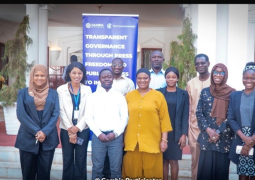
Professor Ramou Njie made this disclosure recently during her presentation as part of activities marking liver cancer awareness forum.
The event held at Medical School Hall at the Edward Francis Small Teaching Hospital in Banjul, attracted medical students, health officials and staff of the hospital.
In her overview of the devastating impact of liver cancer in The Gambia, Professor Njie first paid glowing tribute to all those who died as a result of liver cancer disease.
She acknowledged the devastating nature of liver cancer, highlighting that in the Gambia, liver cancer is a leading cause of death among men and the third for women.
She alluded that in women it is the third commonest after breast and cervical cancers and that many Gambians die prematurely as a result of advanced liver disease and its complications.
She, however, noted some patients with this debilitating health disease make it especially when detected at an early stage.
She made reference to liver cancer cases, saying in 2020 nine-hundred and fifty-thousand liver cases were diagnosed globally.
“In that same year, eight-hundred and fifty have died globally. So, what do we do? Up to three Gambians died every week of liver cancer.”
To this end, she spoke about the need for early vaccination to prevent the transmission of liver cancer, adding that early detection would mitigate the risk of death.
“Most people die if they have hepatitis B positive but not all. If we catch them in the early stages of infection, their chances of survival will be huge.”
“There are many approaches to liver cancer prevention. These efforts include immunization against hepatitis B, hepatitis B treatment, hepatitis C treatment, decreasing alcohol use, decreasing exposure to aflatoxin in agriculture, and management of obesity and diabetes.
She suggests the need for people to go for early screening especially those with chronic liver disease.
“Causes of liver cancer are being overweight or obese, having a long-term hepatitis B virus or hepatitis C virus infection, smoking cigarettes, drinking alcohol, having cirrhosis (scarring of the liver, which can also be caused by hepatitis and alcohol use among other factors.”
Dr. Kebba S. Bojang, programme manager at National Cancer Programme, also expressed similar sentiments.
Dr. Bojang highlighted the debilitating nature of liver disease and called on all to ensure they go for early screening to minimise the burden.





